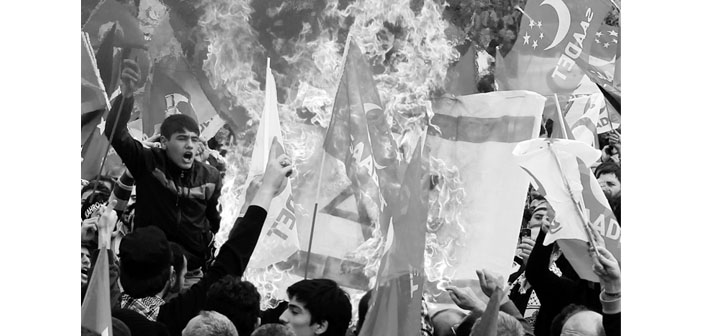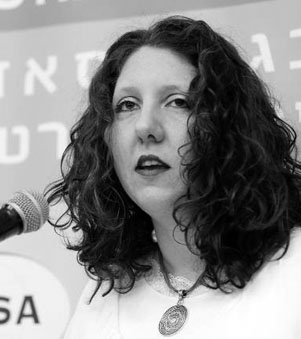‘Nazi suçlaması da Hitler benzetmesi de yanlış’


Araştırmanız çok geniş bir zaman dilimini ele alıp Türkiye’deki antisemitizmi inceliyor, çalışmanızı nasıl bir mantığa göre bölümlendirdiniz?
Kitabımı iki dönem olarak ayırdım. İlki Osmanlı dönemi Yahudileriyle ilgili… O dönemde yaşanan birkaç kanlı meseleyi anlattım ama genel olarak Yahudilerin Osmanlı’da nasıl muamele gördüğünü gözler önüne sermeye çalıştım. Osmanlı millet sistemine ve farklı milletlere yönelik toleransa dair devasa bir akademik düşünce var, bu meseleyi de tartıştım. İkinci bölümse Cumhuriyet dönemini ele alıyor.
Antisemitizmin Türkiye toplumunda oldukça içselleştirilmiş bir olgu olduğuna dair yaygın bir kanı bulunuyor. Türkiye’de çok fazla araştırmanın bulunmadığı bir alanda böyle kapsamlı bir çalışma yapan birisi olarak, sizin bu konudaki gözleminiz ne oldu?

Bu soruyu cevaplamaya Fransalı Yahudi gazeteci arkadaşım Michael Gurfinkiel’in bana anlattığı kısa bir anekdotla başlayayım. Fransa’da Adolf Hitler’in ‘Mein Kampf - Davam’ adlı kitabını basmak yasak olduğu için İstanbul’daki havalimanındaki bir dükkanda bu kitabın bir sürü kopyasını kenara istiflenmiş şekilde görünce şok olmuş. Üst üste duran kopyaların yanına gidip fotoğraflarını çekmeye başlamış. O esnada da dükkanın sahibi Michael’in yanına gelip sormuş: “Affedersiniz efendim, bu kitapların fotoğrafını neden çekiyorsunuz? Yoksa siz yazarı mısınız?” Bence bu hikaye Türkiye’de antisemitizme yönelik bu yaygın duyarsızlıkla ilgili bazı şeyler öğretebilir. Antisemitizmle ilgili ne kadar çok şey öğrenilirse öğrenilsin asla yeterli değil, çünkü antisemitizmin dünyadaki yükselişine şahit oluyoruz. Yine de Türkiye’deki durumun siyah ve beyaz şeklinde anlatılamayacağını düşünüyorum. Burada pek çok kişinin Türkiye’deki antisemitizmi inkar ettiğini söylemek istiyorum. Hatta burada yaşayan bazı Yahudiler bile bunun varlığını kabul etmekte direniyor. Bu durum meseleyi olduğundan çok daha karmaşık hale sokuyor. Varlığını reddettiğin bir şeye nasıl karşı çıkabilirsin? Kitabımda antisiyonizmi de anlatıyorum. Bazen antisemitizmle antisiyonizm arasındaki farklar ve sınırlar Türkiye’dekiler için bulanıklaşabiliyor. Bu üzerinde durmamız gereken bir konu çünkü Türkiye’deki bazı insanlar Yahudilere değil İsrail’e karşı olduklarını söylüyorlar ama istedikleri şey İsrail’i eleştirmek olduğunda bile kullandıkları ifadeler antisemitizm içeriyor.
Türkiye’deki antisemitizmin diğer ülkelerdekinden ne farkı var?
Antisemitizm konusunda benim için Türkiye’yi diğer ülkelerden ayıran şey, Türkiye’de bu olgunun büyük ölçüde mevcut hükümet tarafından dikte ediliyor olması… Söylemek istediğim, elbette antisemitizm Türkiye’de yeni bir olgu değil, cumhuriyetin ilk yıllarında ve daha sonrasında tatbik edilmiş bir düşünce. Fakat o zaman hükümet Yahudilere zarar verenlerle uğraşmamak ya da bu kişilere gereken cevabı vermekte gecikmek niyetinde olmuş olabilir, çoğunlukla – burada çoğunlukla kelimesine vurgu yapmak istiyorum – antisemitizm içeren düşünceleri kendiler i kullanmamışlar. AKP ile bu durum çok değişti. AKP hükümetinin Türkiye toplumu üstünde, en azından bu toplumun belirli bir bölümü üzerinde büyük bir etkisi olduğunu düşünürsek, sorun derin. Çünkü şimdi bunu kabul edelim antisemitizm her yerde var, fakat mesela Fransa’da hiçbir başbakan veya cumhurbaşkanı Yahudilere karşı bir şey söylemez ya da sürekli onlara karşı gelip onları kınamaz. Durum Türkiye’de böyle değil… Cumhurbaşkanı Erdoğan’ın bu konularda daha toleranslı olabileceğini ve böylece bunun topluma da sirayet edebileceğine inanıyorum. Elbette ülkedeki antisemitizmden doğrudan kendisi sorumlu değil, fakat bu düşünce biçiminin yayılmasında kesinlikle büyük bir katkısı var. Kendisinin kullandığı her kelimenin onun destekçileri nezdinde büyük bir anlamı var.
Siz Türkiye’deki antisemitizmi çok geniş bir zaman dilimi içinde ele alıyorsunuz. Bu konuda az da olsa duyarlılığın arttığını gözlemleme şansınız oldu mu?
Evet, Türkiye’de bu konuda bir duyarlılık gelişiyor ki bu oldukça önemli. Bu bir sonraki İsrail harekatında antisemitizm içeren ifadelerle karşılaşmayacağız anlamına gelmiyor fakat duyarlılık eskiden olduğundan daha yüksek. Burada insan hakları savunucularının katkısı çok büyük… Ülkedeki Yahudi toplumunun bir bölümünün de bu söylemin anlaşılmasında katkısı olduğunu belirtmeliyiz. Ancak mesela, bazı akademisyenlerin söylediğinin tersine, okullarda Türkiye’deki lise ve üniversitelerde Holokost’u öğretmek için tasarlanan Aladdin Projesi hayata geçirilmedi. Bu ta en başından beri AB’ye girmek için yapılan şeylerin bir parçası oldu. Hükümetin eylemlerinin arkasındaki niyetin, mantığın ya da sebeplerin çok önemli olmadığını söylüyorum. Ankara’nın neyi neden yaptığını çok ön planda tutmuyorum, ama sonuçları önemsiyorum, bu bahsettiğim proje askıda olsa bile başlamış olması önemli. Kişisel olarak Türkiye’de ‘Piyanist’ ve Lanzmann’ın uzun filmi ‘Shoah’ın gösterilmiş olmasına büyük önem atfediyorum. Bu daha da güçlenmeli.
Son günlerde Türkiye ile Almanya ve Hollanda arasında yaşanan gerilimi ve ‘Nazi polemiğini’ nasıl değerlendiriyorsunuz?
Bu süreçle beraber Avrupa ülkeleri de Türkiye tarafından Nazizmle suçlanan saygın değer ülkeler kulübüne dahil olmuş oldular, İsrail bu konuda artık yalnız değil. Şaka bir yana genel olarak Yahudiler için ve özel olarak İsrail için birilerini ‘Nazi’ olarak ifade etmek için çok iyi bir neden ve bu kişilerin böyle davrandığına dair çok ciddi kanıtlar gerekir. ‘Nazi’ kelimesinin uygunsuz kullanımı çok sorunlu ve tarihe saygısızlık içeren bir durum… Ayrıca ‘Nazi’ kelimesinin kullanıldığı ülkelere ve bu ifadenin kullanıldığı dönemlere bakılması gerekir. Filistinlilerle yaşanan çatışmalar sırasında İsrail’e pek çok defa Türkiyeli yetkililer tarafından ‘bir Nazi ülkesi’ olarak hitap edildi, Almanya ve Hollanda için de Türkiyeli siyasetçilere ülkelerinde konuşma yapmaya izin vermedikleri için aynı ifadeler kullanıldı, bu söylemin arkasında bir tutarlılık veya mantık bulunmuyor. Bu bence Holokost’u hor gören bir yaklaşım ve insanların hala bu şekilde yapıyor olması büyük bir utanç. Türkiye’nin cumhurbaşkanı için de Hitler’e benzetilmesi veya bu şekilde hitap görmek utanç verici. İki türlü de yanlış.


